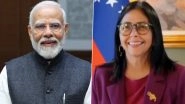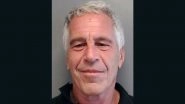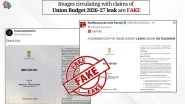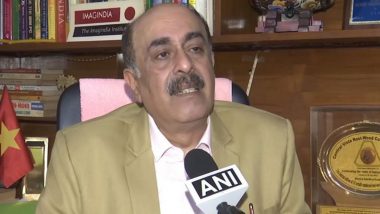New Delhi, October 19: Prime Minister Narendra Modi's bilateral meeting with Russian President Vladimir Putin on the sidelines of the BRICS meeting will be the completion of "one round of peace diplomacy" by the former under his "one-point plan for Ukraine conflict", Foreign Affairs expert Robinder Sachdev said.
In an interview with ANI, Sachdev recalled PM Modi's meetings with President Putin, Ukrainian President Zelenskyy and US President Joe Biden in the past few months. BRICS Summit 2024: Vladimir Putin Praises PM Narendra Modi, Says No Timeline on Ukraine War; Appreciates India’s Concern Over the Situation.
His remarks come ahead of PM Modi's two-day visit to Russia to attend the BRICS Summit in Kazan from October 22-23. When asked about Putin's gratitude to PM Modi for his concern over the Ukraine war, Sachdev said, "The Putin-Modi bilateral meet on the sidelines of BRICS will be the completion of one round of peace diplomacy by Prime Minister Modi under his one-point plan for Ukraine conflict. You have to trace the chronology. Prime Minister Modi met Putin in July in Moscow. After that, he met Zelenskyy in Kyiv in August. Definitely, some messages would have been exchanged, and India would have understood each position better."
"Then Prime Minister Modi met Biden in the Quad meetings. He would have discussed his discussions with Putin and Zelenskyy with Biden. Then Prime Minister Modi met Zelenskyy at the United Nations for a bilateral. Prime Minister Modi would have definitely discussed with Zelenskyy, you know, his ongoing conversation starting with Putin, Zelensky, Biden, and feedback then," he added.
Putin on Friday expressed gratitude to PM Modi for his concern over the Ukraine war and efforts towards paving a solution. Robinder Sachdev said that PM Modi, during his meeting with Putin, will apprise him about the opinions and possibilities of breaking the deadlock on the Ukrainian conflict. BRICS Summit 2024: PM Narendra Modi To Visit Russia From October 22-23 To Attend 16th BRICS Summit in Kazan, Says MEA.
Sachdev said, "And now with all this feedback, he is meeting Putin again. So, this has been one round of peace diplomacy, the first round, I would say, of Modi's one-point plan, because he would now apprise and exchange with Putin what sees as, you know, the opinions and possibilities of breaking the deadlock on the Ukrainian conflict."
He said that Putin during his meeting with PM Modi in July had indicated that he looked forward to seeing India play such a role amid the ongoing conflict between Russia and Ukraine.
Highlighting change in India's foreign policy, he said, "President Putin definitely had indicated that in his July meeting with Prime Minister Modi that he would look forward to such a role by India. So, Indian foreign policy has changed its gears. It's moving proactively to address the Ukraine conflict under what I call as Prime Minister Modi's one-point plan for Ukraine."
Earlier in September, Putin extended an invitation to PM Modi, proposing a bilateral meeting on October 22, on the sidelines of the BRICS Summit in Kazan. During the invitation, Putin also referred to PM Modi as a "good friend." The remarks by Putin came while he met National Security Advisor Ajit Doval on the sidelines of the BRICS National Security Advisers' meeting. Putin had a meeting with Doval at the Constantine Palace in Russia's St. Petersberg.
It will be PM Narendra Modi's second visit to Russia in 2024 as he travelled to Moscow in July to attend the 22nd India-Russia Annual Summit. During his visit to Russia, PM Modi held a bilateral meeting with Russian President Putin. On Putin quoting PM Modi's statement that BRICS is "not an anti-Western group, it is a non-Western group," Robinder Sachdev said, "What President Putin is doing is he's making it comfortable for other countries which are not clearly anti-US to join BRICS and keep it alive and going forward. For example, India, right, we will not want to be in a bloc which is blatantly anti-US, you know, where all statements which come out are like kind of, you know, negating the West. We would like a balanced approach."
He added, "So President Putin, I think, is talking very wisely that BRICS is not an anti-Western bloc, but a non-Western bloc. And the use of term is also interesting, non-West means other than US and Europe, which means Asia, Arab countries, which means Africa, which means Latin America. So President Putin, in a way, is casting a wider net to bring more acceptability to BRICS, especially from a heavyweight like India."
Robinder Sachdev said that Putin is conveying that Russia seeks multi-dimensional ties with its partner countries. He stated that Russia and India shared excellent relations of culture and people-to-people ties in the past. Being asked about Putin's remarks regarding Indian films being popular in Russia, foreign affairs expert said, "What Putin is saying and conveying is that Russia wants and BRICS wants multi-dimensional relations with its partner countries, all partner countries should have multi-dimensional relations, especially also cultural and people-to-people. India and Russia had excellent relations of culture and people-to-people ties in times passed."
"Now, Putin is again trying to revive that. India already has a huge goodwill amongst the Russian people. Indian Bollywood films are very well known, Raj Kapoor is very well known, Mithun Chakravorty is very well known and what Putin is suggesting is that collaboration in cultural areas, shooting of films, etc and this would be an indicator that it's not only with India, Russia is expanding its relations wanting to, but wider amongst the BRICS nations, what Putin is trying is to create an environment of cultural exchanges and more people to people exchanges in the BRICS platform," he further said.
Putin on Friday praised 'Bollywood' and said that Indian films are most popular in the country in a media briefing ahead of the BRICS Summit. On being asked if Russia will give incentives to BRICS member states for shooting films in the country, Putin said, "If we look at BRICS member states, I think in this country Indian films are most popular. We have a special TV channel with Indian movies being shown on it round the clock. We have a lot of interest in Indian films. We hold the BRICS film festival."
He added, "This year Moscow International Film Festival introduces films from BRICS nations. We are positive that if Indian films are interested then we will find some common ground and promote them in Russia. Pharmaceuticals will also be a good undertaking. I am ready to talk to the Prime Minister of India and we will come to terms and there will be no difficulty..."
Robinder Sachdev also spoke about Canadian Foreign Minister Melanie Joly's recent remarks on remaining Indian diplomats in Canada. Melanie Joly warned over a dozen Indian diplomats, who are still in the country to respect the law. "They're clearly on notice," Joly said as quoted by CBC News.
"Six of them have been expelled, including the high commissioner in Ottawa. Others were mainly from Toronto and Vancouver," she said. On being asked about Joly's remarks, Sachdev said, "Certainly, yes. I mean, that does not even arise as a question, right? And by the same token, India would also be conveying to Canada that their diplomats in India should not be indulging in anti-India activities. We have repeatedly, I think, informed them also."
"Canadian diplomats have in the past, engaged in interactions with sections of Indian society, who are very much opposed to policies in India. That's okay. That's an internal Indian affair. Why should Canadian diplomats in India be engaging and seeking to persuade such sections? So, India has absolutely taken a firm stand on that also," he added.
India has "strongly" rejected Canada's allegation that the Indian High Commissioner and other diplomats were "persons of interest" in an investigation and termed it as "preposterous imputations" and part of the political agenda of the Justin Trudeau government.
India said Canadian PM Justin Trudeau's hostility to India has long been in evidence and his government has consciously provided space to violent extremists and terrorists "to harass, threaten and intimidate Indian diplomats and community leaders in Canada".
(The above story is verified and authored by ANI staff, ANI is South Asia's leading multimedia news agency with over 100 bureaus in India, South Asia and across the globe. ANI brings the latest news on Politics and Current Affairs in India & around the World, Sports, Health, Fitness, Entertainment, & News. The views appearing in the above post do not reflect the opinions of LatestLY)













 Quickly
Quickly


